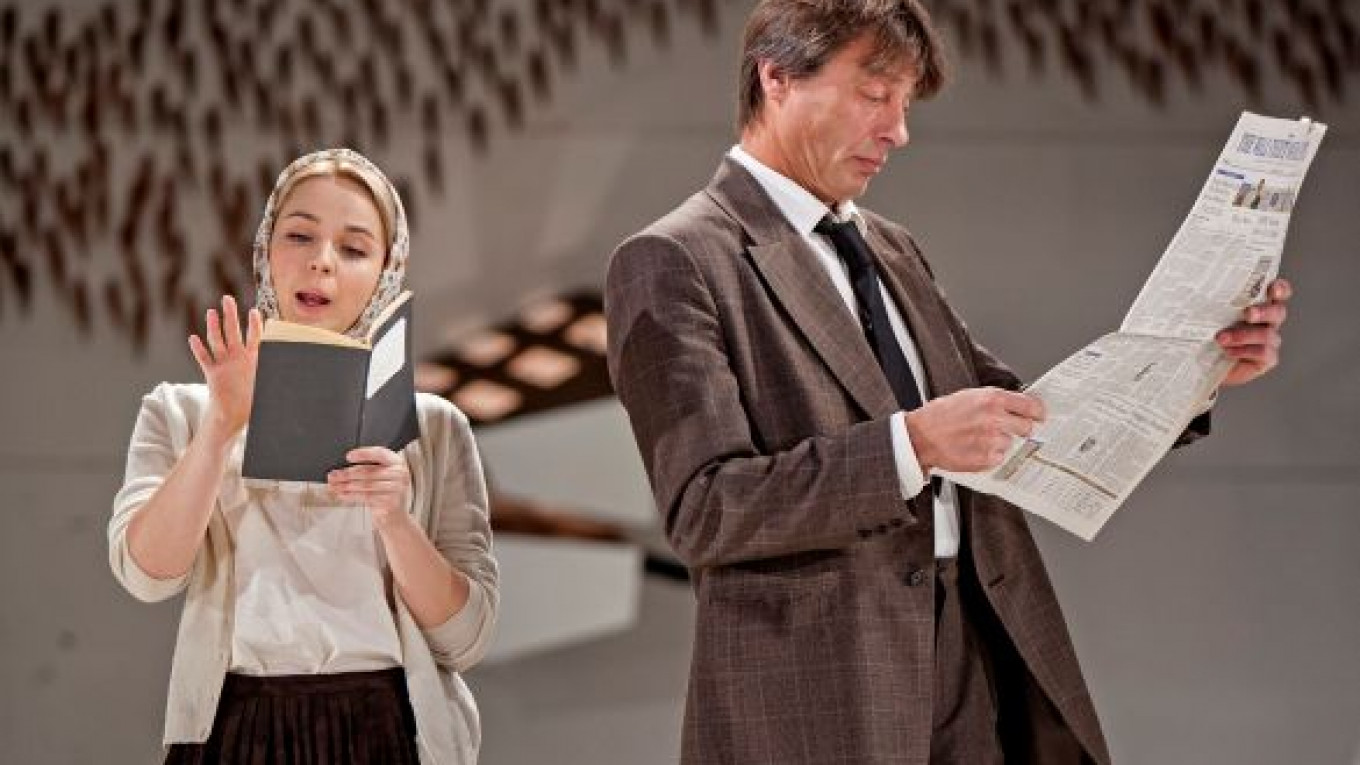There is something missing in "Mr. Puntila and His Man Matti" at the Mayakovsky Theater and it surely is the doing of author Bertolt Brecht.
This "epic comedy," as it sometimes is called, is long, overbloated and underbaked. Unlike some of the great Brecht plays — "Mother Courage," "The Good Person of Sechuan" and "The Caucasian Chalk Circle," to name a few — "Mr. Puntila" comes across as a one-trick pony. In place of the former plays' swirling plots, rich characterizations and complex, often paradoxical, political messages, "Puntila" hammers home the same basic notion all night long — alcohol can change a man's personality beyond recognition.
Of course there is more you can read into the story if you are so inclined. The poor man, though wiser, usually gets the shaft from the rich man. And the rich man, although he thinks he owns the world, doesn't command nearly as much as he thinks.
All of this is worked out in a piddling way that strikes me as being too small and too obvious for the big, bad, brash Brecht.
Aye, but there's the rub. In Mindaugas Karbauskis' production at the Mayakovsky this rather tedious and monotonous tale has been given a beautiful and sometimes compelling production. Yes, the performance often struggles with the play, as if encouraging Brecht in vain to set his sights higher. The wonder is that, often as not, it succeeds.
Karbauskis gives this long, but smallish, play a sense of magnitude and he began with the visuals.
Sergei Barkhin's simple, but exquisite set transforms the characters into museum exhibits. The aperture of the stage contains concentric white frames leading our line of sight back to a bucolic scene of a rural village nestled in the woods as seen from the point of view of a helicopter. Puntila is the owner of a rich forest and Barkhin's set illustrates that while reminding us that we are watching the action transpire as we might peruse a painting in a gallery.
Sergei Skornetsky's bright, white lighting, occasionally giving the effect of effacing shadows altogether, also has the feel of a well-lit museum. It drains the stage of anything resembling real life while making everything on stage accessible to our wandering eye.
The more-or-less modern dress costumes by Natalya Voinova are elegant and simple at the same time, relying largely on black, but allowing whites, browns and even reds to enrich the palette.
Karbauskis has his actors limit the scope of their impersonations, keeping the focus on each character's main traits.
As the wealthy Finnish landowner Puntila Mikhail Filippov is either jovial and kind or harsh and unforgiving, depending upon whether his split-personality hero is under the influence of alcohol or not. As Puntila's chauffeur Matti, Anatoly Lobotsky is cautious and resigned, though always with an understated sense of charm seeping through the cracks. Puntila's daughter Eva is given a head-strong rendering by Zoya Kaidanovskaya.
Natalya Palagushkina plays the family maid Fina with the sparrow-like speed, feminine intuition and human warmth one might expect of the part.
The joy of this production is in watching these actors work together even as their characters work against one another. Filippov and Lobotsky are superb as they share experiences and trade barbs.
What actually happens seems less important and less interesting.
Puntila, drunk out of his mind and happy as a clam in mud, makes the rounds of his village proposing marriage to every poor, single woman he can find. Later, he watches bemused as his daughter's near-wedding with the man of his choice, a pompous attache (Yevgeny Paramonov), nearly becomes a wedding with his man Matti. With the wedding guests including a long list of town dignitaries, there is plenty of room for episodic humor — some of the best of it being provided by Igor Okhlupin as the uncomprehending Pastor and Lyudmila Badulina as his eccentric wife.
It ends with Puntila's long speech about all the great good he sees in his country and his land — trains, fields, lakes, woods, sweet clover and the like. He pontificates as he is surrounded by the bored townspeople, who presumably have a very different take on all this.
It felt to me like Brecht tacked this scene on with a band-aid, as if to say, "Here, I'll finally try to give some weight to this folderol."
But Karbauskis and Co. come out of it looking quite spiffy, indeed.
"Mr. Puntila and His Man Matti" (Gospodin Puntila I Ego Sluga Matti) plays Thurs. at 7 p.m. at the Mayakovsky Theater, located at 19/13 Bolshaya Nikitskaya Ulitsa. Metro Arbatskaya. After a hiatus, it resumes performances in March. Tel. 495-690-4658. Running time: 3 hours, 25 minutes.
Related articles:
A Message from The Moscow Times:
Dear readers,
We are facing unprecedented challenges. Russia's Prosecutor General's Office has designated The Moscow Times as an "undesirable" organization, criminalizing our work and putting our staff at risk of prosecution. This follows our earlier unjust labeling as a "foreign agent."
These actions are direct attempts to silence independent journalism in Russia. The authorities claim our work "discredits the decisions of the Russian leadership." We see things differently: we strive to provide accurate, unbiased reporting on Russia.
We, the journalists of The Moscow Times, refuse to be silenced. But to continue our work, we need your help.
Your support, no matter how small, makes a world of difference. If you can, please support us monthly starting from just $2. It's quick to set up, and every contribution makes a significant impact.
By supporting The Moscow Times, you're defending open, independent journalism in the face of repression. Thank you for standing with us.
Remind me later.







